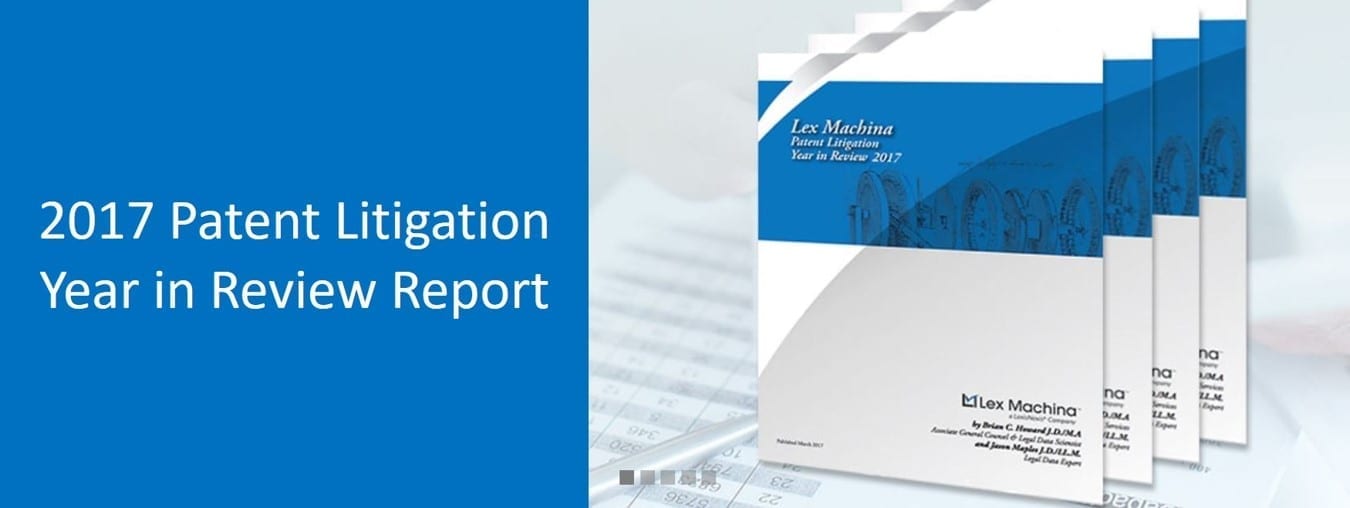Our friends at Lex Machina, recently released the company’s fifth annual Patent Litigation Year in Review report. This report is a wealth of information for those practicing patent law. Below is the company’s announcement and a preview of the helpful information found in the report.
Our friends at Lex Machina, recently released the company’s fifth annual Patent Litigation Year in Review report. This report is a wealth of information for those practicing patent law. Below is the company’s announcement and a preview of the helpful information found in the report.
“The report examines key 2017 patent litigation trends and provides insights gleaned from quantitative data about federal district court cases, Patent Trial and Appeal Board (PTAB) trials and U.S. International Trade Commission (ITC) investigations.
‘The Supreme Court’s decision on TC Heartland v. Kraft dramatically changed the landscape of U.S. patent law by ending the dominance of Judge Rodney Gilstrap and the Eastern District of Texas and leveling the playing field for defendants,’ said Owen Byrd, General Counsel and Chief Evangelist at Lex Machina. ‘Practicing patent law is now a whole new ballgame, with new districts, judges, law firms and attorneys rising to prominence – all of which underscores an even greater need for legal analytics to understand the behaviors and track records of opposing attorneys and presiding judges.’
Overall, the Eastern District of Texas (E.D. Tex.) remained the top court for new patent case filings in 2017 (866 cases) followed closely by the District of Delaware (D. Del.; 777 cases). However, compared to last year, the TC Heartland v. Kraft decision caused new case filings in E.D. Tex. to fall 48% (from 1,662 cases in 2016) and surge 71% in D. Del. (from 454 cases).

Among the report’s other key findings:
- New Cases: New patent case filings declined 10% over last year to 4,060 cases – the lowest level of new case filings since 2011 and continuing a third straight year of decline.
- Judges: For a fifth straight year, Judge Gilstrap (E.D. Tex.) was assigned more patent cases than any other judge. However, his 550 cases in 2017 were less than half of the 1,119 cases assigned to him in 2016.
- Top Plaintiffs: This year, 11 of the top 15 plaintiffs were high-volume plaintiffs, with Pfizer, Bristol-Meyers Squibb, Biogen and Biogen International completing the list.
- Top Defendants: Teva Pharmaceuticals unseated Samsung, the top defendant in 2015 and 2016. Of the top 10 defendants, four were pharmaceutical companies (Teva, Mylan, Aurobindo and Sandoz) and six were technology companies (Samsung, Apple, LG, Amazon and two Chinese multinationals – ZTE Corporation and Huawei Device USA).
- Damages: 2017 saw the award of a total of $763 million in reasonable royalty damages and a total of $284 million in lost profits damages. Compensatory damages remain low, with damages awarded in around 2% of the terminated cases filed since 2000.
- Abbreviated New Drug Application (ANDA): Case filings increased 29% in 2017, reversing the significant decline experienced in 2016.
- PTAB: IPR petitions have continued to decline from a peak of 548 petitions in Q1 2017 to only 356 in Q4, possibly correlated with uncertainty stemming from the upcoming Supreme Court case, Oil States Energy Services, LLC v. Greene’s Energy Group LLC.
‘TC Heartland v. Kraft has already created new trends in patent litigation, but the upcoming decision in Oil States v. Greene’s Energy may have an even greater impact on PTAB cases,’ said Brian Howard, Lex Machina’s Associate General Counsel and Legal Data Scientist, and author of the report. ‘With so much in flux, practitioners should continue to track how these developments play out so they can devise the best legal strategies, provide the best counsel, and make the best business and legal decisions possible.’
The Patent Litigation Year in Review report analyzes filing trends, key decisions and timing metrics, as well as damages and other data. It shows top districts by case filings, top plaintiffs and defendants and their law firms, and median awards of damages by district courts. It also reveals relationships between findings (of infringement or invalidity) and judgment types (e.g., default judgment, summary judgment or trial).
The report data was compiled using Lex Machina’s award-winning Legal Analytics® platform, which is used by many of the top IP law firms in the U.S., and major corporations such as Microsoft, IBM, Nike and eBay. Armed with the report, patent attorneys can make better strategic decisions based on detailed analyses of districts and judges. They can also make sound budgeting decisions using historical data about the timing summary judgment and identify top parties and firms to guide marketing strategies and outside counsel selection.
To request a copy of the full report please register here: http://pages.lexmachina.com/Email_Patent-Report-2017—Request_LP-Social.html.
About Lex Machina
Lex Machina’s award-winning Legal Analytics® platform is a new category of legal technology that fundamentally changes how companies and law firms compete in the business and practice of law. Delivered as Software-as a-Service, Lex Machina provides strategic insights on judges, lawyers, parties, and more, mined from millions of pages of legal information. This allows law firms and companies to predict the behaviors and outcomes that different legal strategies will produce, enabling them to win cases and close business.
Lex Machina was named “Best Legal Analytics” by readers of The Recorder in 2014, 2015 and 2016, and received the “Best New Product of the Year” award in 2015 from the American Association of Law Libraries. It was recently named a 2017 “Legal A.I. Leader” by the National Law Journal.
Based in Silicon Valley, Lex Machina is part of LexisNexis, a leading information provider and a pioneer in delivering trusted legal content and insights through innovative research and productivity solutions, supporting the needs of legal professionals at every step of their workflow. By harnessing the power of Big Data, LexisNexis provides legal professionals with essential information and insights derived from an unmatched collection of legal and news content—fueling productivity, confidence, and better outcomes. For more information, please visit https://lexmachina.com/.”


Join the conversation!